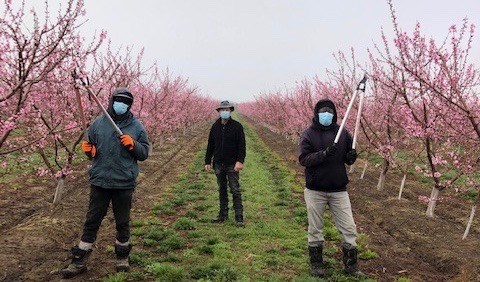
When Phil Tregunno received a phone call asking if he could get a busload of his farmworkers to St. Catharines to be vaccinated, he didn’t hesitate.
The invitation, which came “out of the blue,” included the offshore and Canadian employees at Tregunno Fruit Farms on the Niagara River Parkway, as well as his own family members, he says, a total of 71 people.
He was given about three days’ notice, and at first, he thought he might have trouble getting the workers onboard. They were hesitant, and had questions, he says.
“They responded negatively at first, and fairly vocally negatively.”
It was at the time when AstraZeneca was in the news, he says, and there was a lot of misinformation about vaccinations, which was creating concern, but fortunately, he’d been given some material for them to read, that seemed to help allay their fears, and when they asked if he would get the vaccination, his answer was a resounding yes.
“I told them I would be first in line,” he says, and explained that health care workers had already received vaccinations. There were also questions about which product they would get, so he was happy for their sakes to see it was going to be Pfizer, although for himself, he would have been okay if it had been AstraZeneca.
He also assured the men they wouldn’t lose time or work earnings, which was important to them. “I made sure it wasn’t an issue.”
To his surprise, when it was time to go to the clinic, every one of the men had signed their consent forms.
His only concern now is their second dose is four months away — he’s hoping that will get moved up. And when the time comes, whatever is happening on the farm, he’ll make sure they all get there. Nothing is more important than health care, he says. “We want to get everybody back there and get it done.”
Many of them have since thanked him, and are very appreciative of having been vaccinated, while many other workers on other farms haven’t.
Leading up to vaccination day, the arrival of the men had been stressful enough. Although they had all received negative COVID-19 test results before they left to come to Canada, there were some positives on arrival of every flight, he says.
Tregunno, chair of the Ontario Tender Fruit Growers, says his workers quarantined in a Niagara Falls hotel — although it’s expensive, he didn’t feel there was enough room for them to spread out in their living quarters on the farm. There have also been issues with workers having a positive second test, and if they’re quarantining on the farm, that creates more issues with isolation.
Quite a few tender fruit growers are doing the same, he says, although others are choosing to use living quarters on their farms for isolating.
Although they were given tests to administer to themselves after 10 days of their quarantine, as are all travellers arriving at a Canadian airport, Tregunno says he thought it would be better to have a nurse do it instead. “I’m not sure I could do the test myself.”
Along with other growers in the same situation, he hired Bayshore HealthCare to provide private nurses to do the testing, he says. “We really need health care workers to help navigate the system.”
Instead of using Purolator to deliver the tests to the lab, he drove the tests to Mississauga himself for processing — and then about half of them were then lost, he says. “It’s really been a big issue, but in the end it all worked out.”
It’s been a different start to the season than last year, when the issues were mostly about prevention, when there was confusion about regulations and whether farmworkers would be allowed into the country, and then working out safety protocols regarding cohorts of workers, wearing masks and physical distancing.
But although those were not issues this year, “there was still lots of stress” around testing and vaccinating, says Tregunno.
His was among the first of about 180 farms to be offered appointments at the Seymour-Hannah clinic in St. Catharines, he says — there were other farms who arrived the same day. His understanding is as vaccine is available, there will be appointments for other growers and their employees, and Public Health, which is committed to getting agricultural workers vaccinated, will reach out with the invitation.
Public Health has been involved and very helpful throughout, he says, arranging phone calls with growers every few weeks, and helping them work out the interpretations of provincial rules and regulations. They are also willing to work with growers “when we bring up things that are a little more workable for us. They’re very proactive, they know seasonal workers could be at risk, and they definitely see the agricultural sector as a high priority.”
If Tregunno had one piece of advice regarding the vaccination of agricultural workers, it would be for the government, he says. This week, there were plans to begin vaccinations at the airport as they arrived, but the grower doesn’t think that’s a good idea. Judging by the first reaction he received to the subject of vaccinations, he thinks many will object. “I don’t think they’ll get a good uptake there,” he says.
He would suggest instead they make sure those arriving don’t have COVID, and then let them finish their isolation before vaccinations are offered.
“They need to have the information to help them make that decision,” he says.
And by next year, he wouldn’t be surprised if before leaving to come to Canada, agricultural workers need not only a negative COVID test, but proof of vaccination.